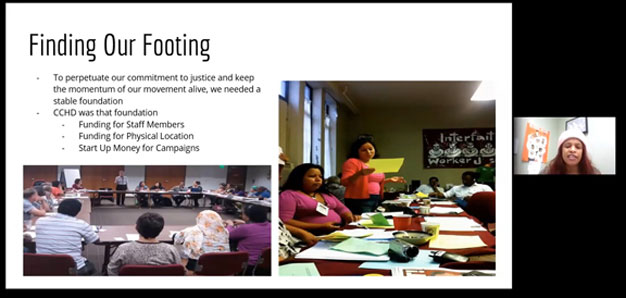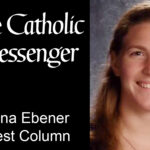
During a recent diocesan Social Action Office Lunch and Learn, Mazahir Salih, executive director of Center for Worker Justice in Iowa City, talks about how Catholic Campaign for Human Development funds have helped her organization reach out to people in need.
By Lindsay Steele
The Catholic Messenger
With the 50th anniversary of the Catholic Campaign for Human Development coming up in May, the diocesan Social Action office got a head start on celebrations with a virtual Lunch and Learn presentation.
The Catholic Campaign for Human Development (CCHD) is the national anti-poverty and social justice program of the U.S. Conference of Catholic Bishops. The April 1 presentation focused on the diocesan connection to the organization and its impact on individuals and families across the diocese.
Remembering Father Mottet
Dan Ebener, a former director of the diocesan Social Action office, started the Lunch and Learn by recognizing the late Msgr. Marvin Mottet, a diocesan priest who preferred to be called Father Mottet. He started the diocesan Social Action office in 1969 and later became executive director of the national CCHD program in Washington, D.C. “It’s hard to talk about CCHD without telling the story of Father Mottet,” said Ebener, who now serves as diocesan director of Parish Planning.

He recalled that when Bishop Gerald O’Keefe asked Father Mottet to direct diocesan Catholic Charities efforts, Father Mottet asked to take a different approach. “He wanted to have a focus on addressing poverty and the causes of poverty” in addition to offering direct assistance. Thus, the “Two Feet of Social Justice” model was born, and so was the diocesan Social Action office.
In 1978, Father Mottet became national director of CCHD. While in the position, he “lived and worked among the poor,” choosing to live in a Catholic Worker house in Washington, D.C., Ebener said. As he did in the Davenport Diocese, Father Mottet worked to implement the “two feet” model at the national level, organizing education and outreach programs “which he saw as crucial to being able to get across the mission of social justice.” He held the position until the mid-1980s.
When Father Mottet returned to the Diocese of Davenport in 1986, he worked with Ebener and volunteers Loxi Hopkins and Glenn Leach, among others, to expand the social justice mission and find opportunities to utilize CCHD grants locally. Quad Cities Interfaith was formed around this time, with assistance from CCHD funding.
Father Mottet passed away in 2016. “I miss him every day,” Ebener said, noting that Father Mottet’s ideas were ahead of their time. He said Catholic Charities and Catholic Relief Services, over time, began to take the “two feet” approach. “They kind of came around to Father Mottet’s way of thinking.”
Local use of CCHD funds
Each year, the Diocese of Davenport hosts a CCHD collection in November, with 25% of funds staying local and 75% going to national efforts. Mazahir Salih, co-founder and director of Center for Worker Justice, spoke at the Lunch and Learn about how CCHD funds have helped the organization promote social justice efforts in the Iowa City area.
In 2012, the Sudan-born Salih and other people from different backgrounds “were trying to figure out how to organize. We were from 17 different countries, but there were many issues we had in common.” Diocesan volunteers Hopkins and Leach were among the first people to reach out to the fledgling group, helping the Center for Worker Justice apply for CCHD funding. “CCHD is the reason we were able to hire staff and create a safe place for immigrants in Iowa,” Salih said.
Some of the issues the Center for Worker Justice (CWJ) works to address include wage theft, identification for individuals who cannot obtain a government ID, and establishment of a living wage, safe housing and immigration services. The organization also offers smaller community outreach programs such as sewing and English classes, summer activities for kids, “Know Your Rights” workshops and after-school tutoring. During the pandemic, CWJ started a “From My Home to Yours’’ program, collecting money to support families hard hit by the pandemic. “The Center supported over 700 families through a total of $369,350,” Salih said.
Internship program
Each year, CCHD funds support an internship program to Quad Cities Interfaith or CWJ. Hopkins said, “We thought it would be a cool way to develop new leaders in this diocese. We’ve had 11 interns, and it’s been fun watching our interns grow.” Interns earn $14 an hour and must be Catholic. Although they do not have to be college students, the interns have generally been from the University of Iowa in Iowa City, St. Ambrose University in Davenport or Augustana College in Rock Island, Illinois. Interns receive training in Washington, D.C., before beginning internships.
At the Lunch and Learn, Hopkins showed a recorded video from former intern Rachel Dunlap. The St. Ambrose graduate said the internship helped solidify her passion for helping the “most vulnerable and marginalized.” Post-graduation, she moved to Philadelphia to participate in a Franciscan Sisters program, working at a community center for immigrant families. For the past three years, she has been working toward dual master’s degrees in Social Work and Theology & Ministry at Boston College. Dunlap said she hopes to work with people with mental illness and/or persons experiencing homelessness.
Hopkins said Dunlap is “a perfect example of the quality of interns with the CCHD program.”
A virtual anniversary of Catholic Campaign for Human Development will take place May 14-15. Look for celebration details in future editions of The Catholic Messenger.











